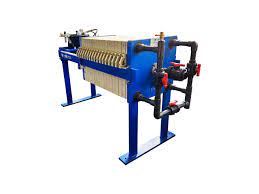Membrane Filter Press: Advanced Industrial Filtration

Strong 8k brings an ultra-HD IPTV experience to your living room and your pocket.
1. Introduction
In the vast landscape of industrial processes, filtration stands out as a critical component, ensuring product quality, safety, and environmental compliance. Among the myriad of filtration equipments, the membrane filter press has emerged as a frontrunner, offering unparalleled efficiency and adaptability, compared with the chamber filter press.
2. What is a Membrane Filter Press?
A membrane filter press is an advanced piece of equipment that combines traditional plate filter press methods with modern technology. At its core, it consists of a series of membrane filter plates and chamber plates. What sets it apart is the incorporation of a flexible membrane (often made of polypropylene) on two side of the filter plates. This unique design allows for enhanced dewatering capabilities, setting it apart from its traditional plate and frame filter press.
3. Membrane Filter Press vs. Recessed Plate Filter Press
Both the Membrane Filter Press and the Recessed Plate Filter Press are widely used in a variety of filtration applications. However, they have distinct characteristics, advantages, and disadvantages.
The chamber plate filter press, a stalwart in the filtration world, relies on a fixed chamber design. While effective, it has its limitations, especially when dealing with varying sludge types. The membrane filter press, on the other hand, offers flexibility. Its design allows for the application of increased pressure after the initial filtration, ensuring drier cakes. This adaptability means that while chamber plate filter presses might be ideal for certain consistent applications, membrane filter presses offer versatility, making them suitable for a broader range of scenarios to get dryer filter cakes.
Disadvantages of the recessed plate filter press:
Less Efficient Dewatering: Cannot achieve the same level of dryness in the filter cake as membrane filter presses.
Longer Filtration Cycles: Without the secondary squeezing phase, filtration can take longer.
Potential for Incomplete Cake Discharge: Depending on the slurry type, there might be challenges in discharging the cake completely.
4. Advantages of Membrane Filter Press
The benefits of using a membrane filter press are manifold:
Enhanced Dewatering: The secondary pressing phase ie the membrane sequeezing ensures significantly drier cakes, crucial for specific applications.
Versatility: Its design makes it adaptable to different sludge types, from mining tailings to chemical residues, sludge in rivers, tunnel sludge.
Faster Filtration Cycles: Due to the secondary pressing phase enabled by the membrane inflation, the filtration cycle is quicker compared to traditional filter presses. This leads to increased throughput and productivity.
Adaptability: Membrane filter presses can adjust to varying sludge types and concentrations. This makes them versatile and suitable for a wide range of industrial applications.
Reduced Operational Costs: Although the initial investment might be higher, the efficiency and speed of the membrane filter press can lead to savings in the long run. This includes savings on disposal costs due to drier cakes and reduced cycle times.
Lower Residual Moisture: The enhanced dewatering capability means that the residual moisture content in the cake is minimized. Then the filter cakes will be easier to transfer to other places.
Environmental Benefits: With better dewatering and reduced waste volume, there's a decrease in the environmental footprint of disposal processes. Additionally, clearer filtrates mean less contamination risk to the environment.
5. Working Principle of Membrane Filter Press
The operation begins with the slurry being pumped into the filter press. As pressure builds, initial filtration separates the liquid filtrate from the solid cake. Once this phase concludes, the magic of the membrane comes into play. The membranes inflate, applying additional pressure, leading to further dewatering of the cake. This two-phase process ensures optimal separation and drier filter cakes.
6. Applications in Different Industries
Mining: In the world of mining, the membrane filter press proves invaluable. It's adept at filtering tailings and mineral concentrates, playing a pivotal role in metal recovery and significantly reducing waste.
Chemical: The chemical industry, with its myriad of compounds, requires precision. The membrane filter press offers just that, efficiently separating solid chemicals from their liquid counterparts, ensuring product purity and quality.
Wastewater Treatment: Perhaps one of the most crucial applications lies in wastewater treatment. Here, the membrane filter press shines in sludge dewatering, reducing waste volume. This not only ensures compliance with environmental standards but also paves the way for resource conservation.
7. Conclusion
The membrane filter press manufactured by Uniwin Filtering, with its advanced design and myriad of benefits, is undeniably a game-changer in the world of industrial filtration. As we move towards a more sustainable future, the emphasis on efficient and eco-friendly processes will only grow. It's high time industries recognize the potential of this modern marvel and consider its adoption for a greener, more efficient tomorrow.
Note: IndiBlogHub features both user-submitted and editorial content. We do not verify third-party contributions. Read our Disclaimer and Privacy Policyfor details.







